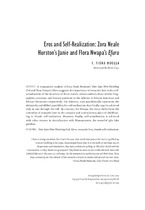| dc.contributor.author | Moolla, Fiona. F | |
| dc.date.accessioned | 2022-02-14T10:14:13Z | |
| dc.date.available | 2022-02-14T10:14:13Z | |
| dc.date.issued | 2020 | |
| dc.identifier.citation | Moolla, F. F. (2020). Eros and Self-Realization: Zora Neale Hurston’s Janie and Flora Nwapa’s Efuru . Utopian Studies, 26(1), 29–48. https://doi.org/10.5325/langhughrevi.26.1.0029 | en_US |
| dc.identifier.issn | 1045-991X | |
| dc.identifier.uri | doi: 10.5325/langhughrevi.26.1.0029 | |
| dc.identifier.uri | http://hdl.handle.net/10566/7246 | |
| dc.description.abstract | A comparative analysis of Zora Neale Hurston’s Teir Eyes Were Watching
God and Flora Nwapa’s Efuru suggests the importance of romantic love to the self actualization of the heroines of these novels, whose authors share similar biog raphies, concerns, and literary positions in the spheres of African American and
African literatures respectively. For Hurston, eros paradoxically represents the
ultimately unfulfilled possibility for self-realization that finally may be achieved
only in and through the self. By contrast, for Nwapa, the focus shifts from the
centrality of romantic love to the complex and contradictory place of childbear ing in female self-realization. However, finally, self-actualization is achieved
with other women in identification with Mammywater, the powerful Igbo lake
goddess | en_US |
| dc.language.iso | en | en_US |
| dc.publisher | The Pennsylvania State University | en_US |
| dc.subject | Their Eyes Were Watching God | en_US |
| dc.subject | Efuru | en_US |
| dc.subject | Romantic love | en_US |
| dc.subject | Female self-realization | en_US |
| dc.subject | African American literature | en_US |
| dc.subject | African literature | en_US |
| dc.title | Eros and Self-Realization: Zora Neale Hurston’s Janie and Flora Nwapa’s Efuru | en_US |
| dc.type | Article | en_US |

